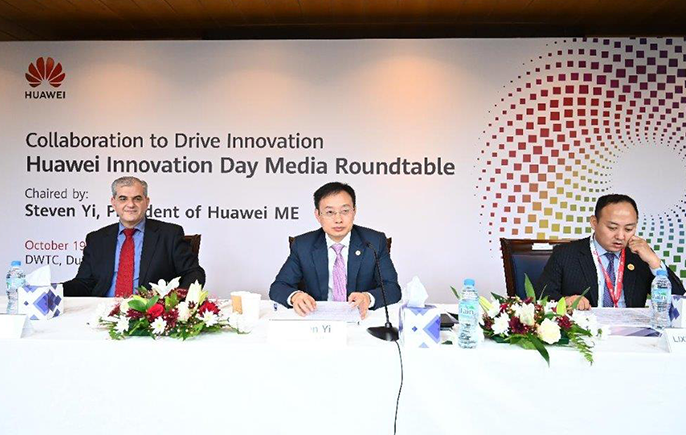Rapid digitization must be collaborative to ensure both prosperity and sustainability in the Middle East and Africa
Steven Yi, President of Huawei Middle East and Africa, says that extending the gains of digitization will require a greater push on talent development, strengthening cybersecurity resilience, and expanding 5G applications
As more industries across the Middle East embrace digital transformation, a focus on collaborative development will be pivotal to extending the gains achieved to date, according to Huawei’s top executive in the region. Steven Yi, the recently appointed President of Huawei Middle East and Africa, spoke with journalists from around the region on the sidelines of the GITEX Global 2021 summit held recently in Dubai, UAE.
The executive noted how many governments and enterprises in the Middle East today have benefited greatly from being at the forefront of emerging technologies—be it 5G commercial deployments, adopting cloud capabilities, designing intelligent city infrastructure, and more. In cloud alone, approximately 81% of enterprises globally now use cloud-based applications, with Yi wanting to extend these benefits to countries in the Middle East. Huawei recently announced investing USD15 million to support cloud-oriented ecosystem development, talent cultivation, and start-ups in the region.
“In the past two years, the development of new technologies and the new normal under the pandemic has accelerated the advent of a digital world,” said Yi. The executive spoke on how that spirit of collaboration in the ICT domain can open new windows of socio-economic progress in line with countries’ national development agendas. Yet it will also take a concerted effort to drive digitalization in ways that will create value for all.
“Openness and globalization are irreversible trends. Almost every country has now formulated its national strategies. Technologies such as 5G, cloud, and AI will greatly benefit the Middle East not only in growing the digital economy, but improving the quality of people’s lives,” noted Yi. In this regard, Huawei has openly collaborated with government entities to contribute to their national visions and enable the development of their ICT ecosystems. As a result, Yi confirmed that the company’s business has continued to grow in the region.
Though we are living in a digital age, Yi acknowledged that some are still left behind and are unable to benefit from emerging technology and the opportunities that it provides. Meanwhile, the UN has estimated that 68% of the world’s population will live in urban areas by 2050, putting pressure on cities themselves to move towards more intelligent management and connectivity.
“Talent is the cornerstone for a digital economy. While each Middle East country has different plans for different situations, talent cultivation must be our long-term strategy,” commented Yi. The executive cited how Huawei alone plans to train 100,000 ICT talent across the Middle East over the next three years, working with local universities and relevant organizations and governments.
In addition to growing the local talent pool, Yi recognized how the sustainable development of the sector would require advancing open, transparent, and secure networks. “We call on all parties to cooperate in fields such as governance architecture, standards, and verification, sharing successful practices so as to enhance the trust and confidence of the society as a whole,” added Yi. “Cybersecurity is really a technical issue, and it needs technical solutions based on verifiable facts and objective methods.”
The launch of a 5G security working group earlier this year within the Organization of the Islamic Cooperation – Computer Emergency Response Team (OIC-CERT) is just one example of such collaboration. In addition to being a member of OIC-CERT, Huawei is one of the first telecommunication vendors to have its 5G equipment audited, tested, and certified under GSMA’s NESAS/SCAS scheme, while contributing to developments of 3GPP’s security specifications.
Touching on 5G specifically, Yi reaffirmed that 5G deployments have been “quite successful” in the Middle East to date, with the number of 5G subscribers in GCC countries estimated to exceed 10 million by the end of 2021. “Traffic is growing rapidly in the Middle East. Since the pandemic, industry digitization and online business have gained strong momentum. The next important step in 5G development is 5GtoB – applying 5G technologies to all industries,” concluded Yi.
The benefits of developing local talent, strengthening cybersecurity frameworks, and expanding 5G applications are further detailed in a new Huawei Intelligent World 2030 report, which provides a glimpse of what the world will look like in 2030 in healthcare, food, living spaces, transportation, cities, enterprises, energy, and digital trust.
About Huawei
Founded in 1987, Huawei is a leading global provider of information and communications technology (ICT) infrastructure and smart devices. We have more than 197,000 employees, and we operate in more than 170 countries and regions, serving more than three billion people around the world.
Our vision and mission is to bring digital to every person, home and organization for a fully connected, intelligent world. To this end, we will drive ubiquitous connectivity and promote equal access to networks; bring cloud and artificial intelligence to all four corners of the earth to provide superior computing power where you need it, when you need it; build digital platforms to help all industries and organizations become more agile, efficient, and dynamic; redefine user experience with AI, making it more personalized for people in all aspects of their life, whether they’re at home, in the office, or on the go.

